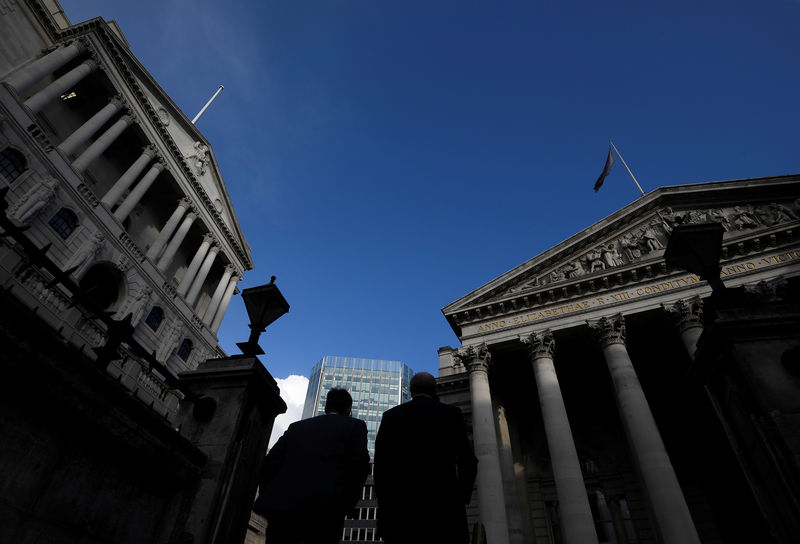By William Schomberg and David Milliken
LONDON (Reuters) - The Bank of England said on Thursday interest rates probably need to rise sooner and by a bit more than it thought only three months ago, because Britain's slow-moving economy is getting a boost from the global recovery.
The BoE's rate-setters are giving themselves time to assess how Britain is coping with its impending departure from the European Union as they voted 9-0 to hold Bank Rate at 0.5 percent, in line with a Reuters poll of economists.
But Governor Mark Carney and colleagues saw a growing need to move faster on raising rates to keep a grip on inflation in the world's sixth-biggest economy, echoing other leading central banks which are moving toward tighter monetary policy, a decade on from the financial crisis.
The BoE said it now wanted to return inflation to its 2 percent target over "a more conventional horizon", which would mean curbing price growth within two years rather than three.
"Were the economy to evolve broadly in line with the February Inflation Report projections, monetary policy would need to be tightened somewhat earlier and by a somewhat greater extent over the forecast period than anticipated at the time of the November Report," the Monetary Policy Committee said.
Sterling jumped by more than a cent against the U.S. dollar
Rate futures showed investors saw a nearly 70 percent chance of a rate hike in May
"It is no surprise to see interest rates being kept on hold this month. But it is still likely that we will see at least one quarter point rise in 2018 and possibly two or three," said Andrew Sentance, a former BoE rate-setter and senior economic adviser to accountants PwC.
Britain's economy slowed after the 2016 Brexit vote but has fared better than many investors expected at the time of the referendum, thanks largely to the much stronger global rebound in the United States, Germany and other key trading partners.
Although inflation has been running well above its 2 percent target, the BoE has raised rates only once so far since the 2007-09 financial crisis - in November - while the U.S. Federal Reserve has raised them five times.
BREXIT FACTOR
Jeremy Cook, an economist at currency brokers WorldFirst, said the BoE's plans to raise rates faster could go awry if this year's negotiations between Brussels and London over Brexit turn sour.
"This is optimistic stuff albeit underlined by the fairly monstrous caveat that the Brexit that the UK government is able to deliver is a smooth one," Cook said.
Carney said the BoE was watching to see if Prime Minister Theresa May can clinch a transition deal next month to secure full access for Britain to EU markets for about two years after it leaves the bloc in March 2019.
The BoE still expected the overall Brexit process to go smoothly, he said, before adding: "But we'll learn."
The BoE nudged up its economic growth forecasts for Britain to show an average annual expansion of 1.75 percent over the next three years.
That was a lot weaker than its expectation of global growth of nearly 4 percent over the same period and was also below the country's pre-financial crisis average of about 2.9 percent.
The BoE linked the sluggish British outlook to slower growth in the labor force, as fewer immigrants come to Britain after Brexit, and to the country's aging population.
But even with slower growth, Britain remained susceptible to excessive inflation. The BoE said it expected the economy could only grow by 1.5 percent a year before it risked overheating.
Annual wage growth is expected to pick up to 3 percent by the end of 2018, in line with previous forecasts. The BoE has often been too optimistic about wages.

The BoE lowered most of its inflation projections after sterling rose recently and bond yields in financial markets jumped. But inflation was expected to remain above the 2 percent target at 2.11 percent in three years' time.